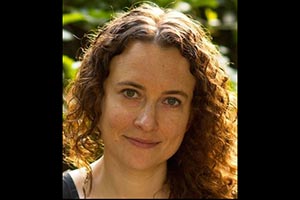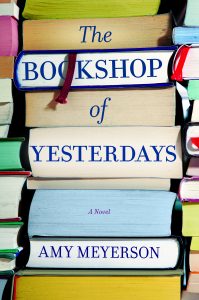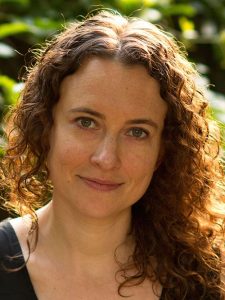Debut Novel from Meyerson ’04 Is a Book-Lover’s Delight

Amy Meyerson ’04 teaches in the writing department at the University of Southern California, where she completed her graduate work in creative writing. While she has been published in numerous literary magazines, The Bookshop of Yesterdays is her first novel. The book has received coverage in both the Washington Post and Philadelphia Inquirer.
Q: What was your impetus for writing The Bookshop of Yesterdays?
A: Years ago, when I was in grad school, I read an essay in the New York Times Book Review about the various items people abandoned—intentionally and not—in books. The essay mentioned everything from food scraps to money to a dirty Q-tip. I was really charmed by the idea that we could learn a lot about an individual based on the items that person left behind in books. I cut out the essay from the newspaper and carried it in my notebook for a few years without really knowing why. Eventually, that became the impetus for my novel.
Q: When did you realize your idea had everything it needed to become a novel?
A: At Wesleyan, I wrote a novel for my senior thesis that began as a short story and ballooned into something larger. I was studying with Alex Chee [’89], and at our first thesis meeting, after I’d sent him what I thought was a short story, he told me that I was really writing a novel. I don’t think I was entirely equipped to write a novel, but he was right—the world I was building, the characters, they needed more space to be fully developed. I remembered Alex’s words when I started writing a short story that kept getting longer and longer about a man who owned a bookshop. From there, I had to step back and figure out the plot, but that was when I knew I was working on a novel: when the character couldn’t be contained.
 Q: Which character came first?
Q: Which character came first?
A: Uncle Billy, who is dead when the novel begins; we only see him in flashbacks. The short story that eventually became this novel was told from his point of view. None of it appears in the novel, but it helped me do the necessary character work to get to know him. Miranda, the protagonist, remembers him as this wildly exciting person from her youth, but others saw different sides of him. I liked constructing a character out of other people’s images of him, rather than Billy’s perception of himself.
Q: Which character and/or scene was the hardest for you to write and why?
A: The most challenging part of drafting this novel was coming up with the scavenger hunt. At each step of the journey, Miranda receives a book—mostly classic literature—containing a clue or riddle that leads her to meet another person from Billy’s past. In addition to leaving a clue, Billy also highlights a section of the novel that tells Miranda how to interpret the story she learns about her uncle from that section of the quest. So, I had to choose the novels very carefully; the themes or plot needed to resonate with the story I was telling and the highlighted section had to work as a self-contained excerpt. To further complicate matters, I wanted the books in the novel to be ones that most readers would know and love. At first, I picked more obscure titles, but my early readers reminded me that part of the fun for the reader was solving Billy’s riddles alongside Miranda. To do this, the reader had to know the novels Billy left for Miranda. Then, to complicate matters more, whenever I changed the plot, I also had to change the novel I used in that step of the journey. I hope that the end result feels effortless, but it was incredibly challenging to choose the right books to use in the scavenger hunt.
Q: Many times, writing a good book requires an author to cut scenes or characters they love but that just don’t fit into the narrative. Did you have that experience with The Bookshop of Yesterdays?
A: Definitely. In earlier drafts, the secret at the heart of the novel was different than it is now and involved a subplot that I really loved. Ultimately, it just didn’t advance the story in the way it needed to, so I had to cut it. I actually find cutting really freeing. I say it to my students all the time: “Kill your darlings.” We often hold onto things that don’t serve the story simply because we love them. I think cutting those unnecessary darlings is a way of acknowledging to yourself that you’ll craft other passages you love that are even better because they are there for a reason.
Q: This is your first published novel. Is this also your first attempt—or do you have any half-finished manuscripts or unpublished novels? If so, what was different with this book?
A: My senior thesis at Wesleyan was my only other attempt at writing a novel. I’m glad I tried to write a novel as an undergraduate, but I’m also relieved it never got published and only exists on the hard drive of my first laptop, where no one will ever find it.
This novel took me about six years to write, and I wrote at least two entirely different versions of it. Several of my friends wrote multiple novels in that time, but I just kept revising until this novel became something I could confidently submit to agents. So, I think of this as both my first and second novel. At some point, a writer needs to decide whether or not to stick with a project. I believed in this book, so I kept hammering away until I was pleased with the results.

Q: You obviously have a lifelong love of books! Did you have a favorite book when you were growing up?
A: For The Bookshop of Yesterdays, I got to revisit a lot of books I love. I hadn’t read The Westing Game in years and had forgotten just how wonderful it is. It’s really sophisticated and doesn’t pander to its young audience. I can’t remember if The Westing Game was my favorite book growing up, but it’s become my favorite children’s book.
Q: What was the first book that stuck with you, either as a child or an adult?
A: I’m probably not supposed to admit this, but I didn’t love reading until high school. The first book that really affected me was Even Cowgirls Get the Blues. I’d never read anything like it. It was so engaging and a little crass and startling. I remember reading it in two days. Then I discovered Slaughterhouse-Five and The Handmaid’s Tale and became a reader.
Q: How has publishing your first book changed your writing process, if it has? And what surprised you most about the publishing process?
A: I often tell my students that you have to know who you’re writing for—i.e., who your audience is—but this wasn’t something I was doing in my own writing. At first I was writing for me and maybe my writer friends. As I progressed down the publishing path, I started to understand that I was writing for readers, specifically those who wanted to celebrate their love of books. Now, I have a clearer sense not only of my audience but the fact that I have an audience. This makes me a more efficient writer. I am constantly asking myself, will someone else be interested in this? Does it advance the story? Is it satisfying? With The Bookshop of Yesterdays, I allowed myself more liberties to be long-winded because I wasn’t certain anyone else would ever read it. Now, I know at least a few people will, and I need to write to engage them.
To this end, the thing that surprised me most about publishing was the kind of notes I received from my agent and editors. Writers tend to give very specific notes about craft that are often based on how they would have written your story. Those notes are really important, but they aren’t geared toward readers who aren’t writers. The notes I received from professionals were more big picture, concerned with the mechanics of the storytelling and the reader’s satisfaction. It’s changed how I think about crafting a story.
Q: You teach writing at the University of Southern California. Has publishing your first book changed how you teach?
A: I don’t know that it’s changed how I teach, but I think students put greater stock in my advice. As a teacher, I stress the importance of revising. Generally, students hate reviewing their writing. They just want to hand it in, never think about it again, and move on to the next thing, but that’s not how you grow as a writer. You need to scrutinize your work and be honest about your strengths and weaknesses. When I tell students how many drafts of my novel I wrote, they are shocked. I’m really honest about how much work goes into writing. Students tend to have one of two responses: this either compels them to work harder or this forces them to admit that they are unwilling to put in the work to become a better writer. Obviously, I prefer the former, but ultimately it’s up to them to decide whether or not to commit to their craft.
Q: Tell us about your new project.
A: I’ve started working on a new novel about a family heirloom. It’s been really interesting to see what I’ve learned from the first novel that makes the process easier and which challenges persist. I’m definitely better at being decisive, but it turns out writing a novel is still tremendously difficult, even if you’ve done it before.
Q: Now that you’re a published author, do you have any advice for writers hoping to join the ranks?
A: One of my favorite things about publishing is that I’ve gotten to meet a lot of other writers who are also publishing their first novels—and I quickly realized that no two stories are the same. Some people find an agent really quickly but go through several rounds of rejections with editors before their projects find a home. For others, the agent stage takes a long time, and then they get multiple offers from publishers within a few days of submission. For most people, however, both stages take a long time. And the process of publishing itself is entirely unique to each title. I’ve learned that you can’t compare your experience to anyone else’s. You just have to believe in your book, weather the inevitable rejection, and persevere.
I’ve also found that being open to feedback is really important. There are some writers who have a clear vision and trust themselves implicitly. While you have to believe in your work, being receptive to other people’s visions for your book is essential. Sometimes, outsiders can have a clearer impression of your writing than you do. My editors had some interesting ideas that took the novel in unexpected directions. Even if writing is solitary, publishing is collaborative. By being open to the process, I not only ended up with a finished novel that was stronger but also learned a lot about writing.

